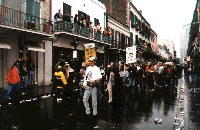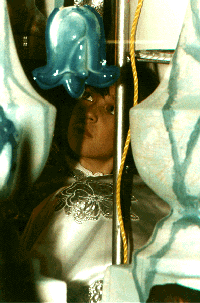![[ICC Carnival New Orleans]](g/mgtitle.gif)
![[History]](g/history.gif)
What is Mardi Gras?
The observance of a "Carnival" (aka Mardi Gras) before the Lenten period (a Christian symbolic penitence from Ash Wednesday to Easter) is not new. It originated in the middle of the second century in Rome when the Fast of the 40 days of Lent was preceded by a feast of several days during which time participants delivered themselves up to voluntary madness, put on masks, clothed themselves like spectres, gave themselves up to Bacchus and Venus and considered all pleasure allowable.
 The name carnival is derived from the Latin Caro, Carnis,
flesh, and vale, farewell (according to Ducange, from the
Latin denomination of the feasts of the Middle Ages, carnis levamen,
solace of the flesh), because at that time people took leave of flesh.
The carnival of the modern world is nothing more or less than the
Saturnalia of the Christian Romans who could not forget their pagan
festivals. From Rome, the celebration spread to other European countries
and finally to America. Carnival is still observed in many American
cities but certainly not with the glamour and grandeur that is attendant
to the New Orleans carnival which had its birth in 1827, when a group of
students, recently returned from school in Paris, donned strange costumes
and danced their way through the streets. The students got the idea for
their Mardi Gras revelry from the celebrations they had experienced in
Paris.
The name carnival is derived from the Latin Caro, Carnis,
flesh, and vale, farewell (according to Ducange, from the
Latin denomination of the feasts of the Middle Ages, carnis levamen,
solace of the flesh), because at that time people took leave of flesh.
The carnival of the modern world is nothing more or less than the
Saturnalia of the Christian Romans who could not forget their pagan
festivals. From Rome, the celebration spread to other European countries
and finally to America. Carnival is still observed in many American
cities but certainly not with the glamour and grandeur that is attendant
to the New Orleans carnival which had its birth in 1827, when a group of
students, recently returned from school in Paris, donned strange costumes
and danced their way through the streets. The students got the idea for
their Mardi Gras revelry from the celebrations they had experienced in
Paris.
 New Orleanians caught the enthusiasm of the youths and from 1827 to 1833.
Mardi Gras each year saw more and more revelries, culminating in an
annual Mardi Gras ball. In 1833 Bernard Xavier de Marigny de Mandeville,
a rich plantation owner, solicited large amount to help finance an
organized Mardi Gras celebration. It was not until 1837 however, that the
first Mardi Gras parade was staged. The first description of a Mardi Gras
parade is of a single float in 1839 which was a crude thing, but a great
success. It is reported that the float moved through the streets while
the crowd roared hilariously. Since then Mardi Gras in New Orleans has
been a definite success. It continued to grow, with additional
organizations participating each year until the Carnival as we know it
today was the result.
New Orleanians caught the enthusiasm of the youths and from 1827 to 1833.
Mardi Gras each year saw more and more revelries, culminating in an
annual Mardi Gras ball. In 1833 Bernard Xavier de Marigny de Mandeville,
a rich plantation owner, solicited large amount to help finance an
organized Mardi Gras celebration. It was not until 1837 however, that the
first Mardi Gras parade was staged. The first description of a Mardi Gras
parade is of a single float in 1839 which was a crude thing, but a great
success. It is reported that the float moved through the streets while
the crowd roared hilariously. Since then Mardi Gras in New Orleans has
been a definite success. It continued to grow, with additional
organizations participating each year until the Carnival as we know it
today was the result.
There is no celebration in the world which is as much misconstrued as the New Orleans Mardi Gras. Laboring under a misconception, the vast majority of people outside of New Orleans believe that the New Orleans Mardi Gras is a celebration spreading over a period of a few days just before Ash Wednesday. In reality the New Orleans carnival is similar to the Fasching of Germany which begins on the twelfth night after Christmas and continues until Shrove Tuesday. The expression Mardi Gras is from the French, meaning Fat Tuesday."



Copyright © 1996-2014, InterCommerce Corporation,
All Rights Reserved Worldwide
Comments & Feedback appreciated!
(http://www.icorp.net/icorp/feedback.htm)


Copyright © 1996-2014, InterCommerce Corporation, All Rights Reserved Worldwide
Comments & Feedback appreciated! (http://www.icorp.net/icorp/feedback.htm)